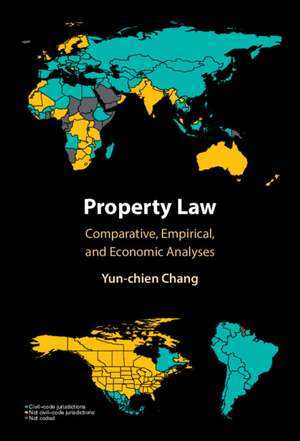Property Law: Comparative, Empirical, and Economic Analyses
Autor Yun-chien Changen Limba Engleză Hardback – 31 mai 2023
Preț: 760.82 lei
Preț vechi: 884.68 lei
-14% Nou
Puncte Express: 1141
Preț estimativ în valută:
145.58€ • 152.41$ • 120.46£
145.58€ • 152.41$ • 120.46£
Carte tipărită la comandă
Livrare economică 07-21 aprilie
Preluare comenzi: 021 569.72.76
Specificații
ISBN-13: 9781009236591
ISBN-10: 1009236598
Pagini: 400
Dimensiuni: 237 x 160 x 33 mm
Greutate: 0.77 kg
Editura: Cambridge University Press
Colecția Cambridge University Press
Locul publicării:Cambridge, United Kingdom
ISBN-10: 1009236598
Pagini: 400
Dimensiuni: 237 x 160 x 33 mm
Greutate: 0.77 kg
Editura: Cambridge University Press
Colecția Cambridge University Press
Locul publicării:Cambridge, United Kingdom
Cuprins
Introduction; Part I. Foundation: 1. Property Law around the World: An Empirical Overview; 2. Economic Framework; 3. Limited Number of Limited Property Rights: Less is More; 4. Transfer of Ownership: Transaction Cost v. Information Cost; Part II. Immovable Property: 5. Acquisitive Prescription: Hardly Justified in Modern, Developed Countries; 6. Building Encroachment: In Search of an Efficiency Justification; 7. Co-ownership Partition: Proposing a New Auction-based Design; 8. Managing Co-ownership: Tragedy of the Common-Ownership? 9. Access to Landlocked Land: Hybrid Entitlement Protection; Part III. Movable Property: 10. Good-faith Purchaser: Proposing Fractional Ownership and Internal Auction; 11. Finders, Keepers: A Minority Rule; 12. The Specificatio Doctrine: Do What the Romans Did; 13. The Accessio Doctrine: No Sign of Convergence.
Recenzii
'With its unprecedented wealth of data on property laws in jurisdictions around the world, this book is a methodological tour de force. The innovative economic analysis draws on an often surprising comparative picture, and the comparative work is informed by a sophisticated theoretical vision. Chang has produced a landmark in both comparative law and the law and economics of property.' Henry Smith, Fessenden Professor of Law, Harvard Law School
'Yun-chien Chang's monumental empirical study of property institutions across the globe yields genuine insight into the nature and value of different property norms. A technically impressive piece of scholarship that identifies and codes property rules across 156 jurisdictions, it provides a compelling answer to an important question, the comparative efficiency of common law and civilian approaches to property law. Blending empirical, doctrinal, and normative approaches, Yun-chien Chang has moved our understanding of property institutions onto an entirely new and impressively solid foundation. I fully expect this truly extraordinary piece of work will become both a point of reference and a source of inspiration for the policymakers, lawmakers, and scholars around the world.' Larissa Katz, Professor and Canada Research Chair in Private Law Theory, University of Toronto
'Systems of property law differ, but as this book shows they differ not so much as one would think. This book offers a very impressive comparative overview of property law across the globe by coding legal systems. In doing so Chang offers deep insights into the general structure of property law and categories of approaches to problems.' Bram Akkermans, Professor of Property Law, Maastricht University
'Yun-chien Chang's monumental empirical study of property institutions across the globe yields genuine insight into the nature and value of different property norms. A technically impressive piece of scholarship that identifies and codes property rules across 156 jurisdictions, it provides a compelling answer to an important question, the comparative efficiency of common law and civilian approaches to property law. Blending empirical, doctrinal, and normative approaches, Yun-chien Chang has moved our understanding of property institutions onto an entirely new and impressively solid foundation. I fully expect this truly extraordinary piece of work will become both a point of reference and a source of inspiration for the policymakers, lawmakers, and scholars around the world.' Larissa Katz, Professor and Canada Research Chair in Private Law Theory, University of Toronto
'Systems of property law differ, but as this book shows they differ not so much as one would think. This book offers a very impressive comparative overview of property law across the globe by coding legal systems. In doing so Chang offers deep insights into the general structure of property law and categories of approaches to problems.' Bram Akkermans, Professor of Property Law, Maastricht University
Notă biografică
Descriere
Use hand-coded data on nearly 300 dimensions on the substance of property law in 156 jurisdictions in the world.
